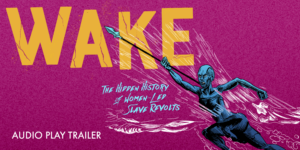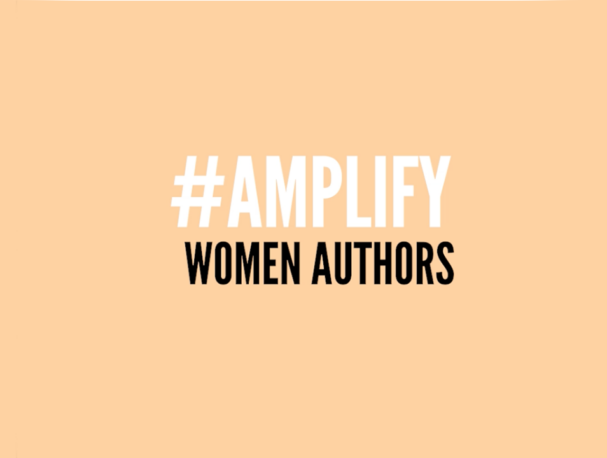WAKE: The Hidden History of Women-Led Slave Revolts | Audio Play Producers Interview
Selected as a best book of 2021 by NPR, The Washington Post, Forbes, and Ms. Magazine, Wake is an imaginative tour-de-force that tells the powerful story of women-led slave revolts, and chronicles scholar Rebecca Hall’s efforts to uncover the truth about these women warriors who, until now, have been left out of the historical record. Originally published as part […]

Selected as a best book of 2021 by NPR, The Washington Post, Forbes, and Ms. Magazine, Wake is an imaginative tour-de-force that tells the powerful story of women-led slave revolts, and chronicles scholar Rebecca Hall’s efforts to uncover the truth about these women warriors who, until now, have been left out of the historical record.
Originally published as part graphic novel and part memoir, Wake has now been adapted into a dramatized audio original by critically acclaimed playwright and television writer Tyler English-Beckwith and features the voice talents of DeWanda Wise (Spike Lee’s She’s Gotta Have It, Jurassic World: Dominion, The Harder They Fall), Chanté Adams, (A League of Their Own, Roxanne Roxanne, A Journal for Jordan) and an all-star full cast.
But what goes into making an audio original? In the case of WAKE, over 35 creatives came together to collaborate on the work – producers, writers, actors, designers, composers. Here is an interview two of the lead producers on WAKE – Larry Powell and Mark Holden – and how they brought their hearts, spirits and skill sets to make this piece come to life.
Larry and Mark, what were your roles in the creation of WAKE?
LARRY: Casting Director/ Associate Producer. I helped to lead the assembly of wonderful artists giving voice to the many characters that make up this incredible story. I put all of these amazing folks together with my partner Anna Lyse Erikson and Tamara Marston, Podium’s in house Head of Casting!
MARK: Creative Producer / Designer. I was initially brought on as the owner of The Invisible Studios where Wake was to be produced to usher the technical aspects from inception through delivery. My role quickly expanded into Creative Producer and Designer because of my experience producing, directing, and designing Audio Dramas. Along with Maggie Silver and the other folks at Podium, I helped bring together the core creative team including casting directors and associate producers Larry Powell and Anna Lyse Erikson, the Director; Simone Barros, and composer Jace Clayton. I was also lucky enough to get my good friend Jeff Gardner to help with foley and fx. For production and post, I worked closely with our studio’s team to design the space and emphasize the design elements that bring this beautiful story to life.
What sparked you both to this project in particular?
MARK: Within minutes of being sent Rebecca’s and Hugo’s amazing words and images, I started to imagine the design, the creative team, the process, and most importantly the space for this important piece.
LARRY: The story. The fact that there was a story about a black woman who did the near impossible to unearth the history of women-led slave revolts and then took it a step further and found a way, against all odds, to share it with the world in an exciting, visually fresh way. It is my ancestral duty to do whatever I can to help a story like this be told to the best of its ability. So, I jumped to serve, in whatever capacity.
I also really respected and was grateful to be approached by a team of non-black powerhouses who took the time to say, “you know, maybe we aren’t the best ones to find the right people to tell this story that is made up of characters across the African diaspora. Let’s find the person who is the best for this job!” And I’m happy that was me.
Larry, given the sheer number of characters spanning hundreds of years, dow did you approach the casting process?
LARRY: I have a strong foundation and history in Storytelling via Live Theatre. I classically trained at Carnegie Mellon University as an actor and writer. Theatre opens up a whole new world when it comes to actors playing multiple characters. Most times it’s because of budgetary constraints but necessity is the mother of invention and a lack of budget can birth brilliant creative choices. There have been many productions I’ve fallen in love with that have used a core group of “players” to play multiple roles.
I offered this concept, to combine roles into tracks, to our director Simone V. Barros and team, and they were excited by it and chose to move forward. We then chose to name these tracks of characters “Storyteller”, because that is what we are all doing at the end of the day, telling an important story. So, Storyteller 1, 2, 3 and so on. From there it was my job to assemble lists actors/artists who had the depth and range to play characters across the generations, societies, cultures, and regions. This was a very tedious, at times difficult process actually as one might imagine.
Because of the subject matter and the spiritual way in which I approach pulling people together, I had to really take my time and sit in silence a lot, I had to truly listen to who I felt was being called to the piece (whether i know them and their work or not)— it’s a instinctive feeling from within mixed with signs I receive from the ancestors on the outside. Ultimately, we ended up with a cast that most dream of being able to land.
Mark, what was your approach to creating the soundscape for the piece? How does the recording technique for an audio drama differ from recording an audiobook?
MARK: For the soundscape, we approached it with a combination of accuracy, surrealism, and hyperrealism. Because the piece shifts from place to place, we needed ways to communicate to the listener that we were moving through time and space both literally and figuratively. To achieve this in the recording room, we consider room acoustics, microphone choice, blocking in the stereo space, and microphone proximity. Without getting too technical, we use some hybrid methods to record Audio Dramas that are rarely used in the states because it takes a team trained in these methods to imagine and fully realize the piece before recording and through the post process. In post, we used a combination of created foley, found FX, and lots and lots of virtual spaces.
Larry, next for you guys in the audio world?
LARRY: I’m looking forward to people hearing our recording of the play PIPELINE by Dominique Morriseau, who was recently nominated for her second TONY Award for her play “Skeleton Crew” which Philicia Rashad won her second Tony Award for. I recently directed a production of “Pipeline” for LA Theater Works — check it out.
Mark, you own one of the top sound studios in Hollywood – what project is next for you that is most exciting?
MARK: Oh! I can now mention that we will be working on Sesame Street The Musical with Sesame Workshop and Rockefeller Productions. If that’s not exciting, I’m not sure what is?!
MORE NEWS
See All
#Amplify Women’s History Month 2024
To celebrate Women’s History Month, we were excited to #Amplify four women authors (Allison Anderson, K.A. Gandy, Jamie Kojola, and E.P. Bali), where they discussed their favorite female main character they wrote and why they feel connected to [...]

Podium Secures Print Rights for C.R. Jane’s BookTok Hit The Pucking Wrong Series
Podium is thrilled to announce the acquisition of North American print publishing rights to The Pucking Wrong series, the bestselling hockey romance from C.R. Jane. C.R. Jane is an Amazon bestseller who started independently publishing The Pucking Wr [...]

Podium Expands into Print Retail Distribution
Podium is excited to announce their partnership with Two Rivers Distribution, an Ingram Publisher Services LLC brand, as their exclusive distribution partner for print books. Two Rivers Distribution was selected by Podium as the ideal partner for the [...]

Podium Secures First Look Deal with WarGate Books
Podium Audio, a leading digital-first publisher, is thrilled to announce an exclusive first look deal with WarGate Books, the publishing company co-founded by bestselling authors Jason Anspach and Nick Cole. Both Jason Anspach and Nick Cole have be [...]